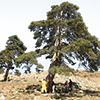Background and Project Overview
The Mediterranean Basin has been identified by general circulation models (GCMs) as regions of high sensitivity of climate to increasing greenhouse gases. Our research will and addresses the long-term climate variability of the Mediterranean Basin from a comparative analysis of climatic data, model simulations, and tree-ring data. A network of drought-sensitive tree-ring chronologies from the EM and NA will be analyzed for information on long-term climate variability, associated atmosphere-ocean anomalies, and the ability of GCMs to reproduce important drought-related features of regional climate. The work blends chronologies from the Mediterranean region to generate a Mediterranean Basin Drought Atlas (MBDA) that chronicles spatiotemporal drought variability over the past few centuries to millennium. Reconstructions will include seasonal precipitation and the Palmer Drought Severity Index. The reconstructions will be analyzed for the relationship of droughts and wet periods to atmospheric circulation and sea-surface temperature (SST) anomalies. Drought patterns of the past and present will be placed in context of climate-change projections from GCMs.
Tree-Ring network for the Eastern Mediterranean and Near East regions
Refined knowledge and understanding of the full range of past hydroclimatic variability over EM, NA, and other parts of the Mediterranean Basin is critical for improved understanding of factors driving that variability and handling of low-frequency climate variability by GCMs. Our research is the first effort at assembling and interpreting networks of tree-ring chronologies for this purpose in the region. The synthesis effort will exploit the rich resource of recently-developed tree-ring data for improved estimates of potential near-term future hydroclimatic variability and explore novel methods of time series analysis to place current and future hydroclimatic variability in a long-term context.
Tree-Ring network for North Africa
Our work will improve and update the climate history of the Mediterranean basin, and provide a baseline for assessing past and future drought. A regional societal benefit is improved resource management and lessened environmental degradation in Mediterranean countries. The MBDA will complement the ongoing Old World Drought Atlas’ (OWDA), the existing ‘North American Drought Atlas’ (NADA) and the new ‘Monsoon Asia Drought Atlas’ (MADA). Our research will help integrate research and education by developing the scientific and human resources in the region. Students, scientists, and natural resource managers in the region will be exposed to the science of dendrochronology and its practical applications through workshops, short-term courses, meetings and participation in field work. The collaboration will foster development of local scientific efforts and the exchange of students and knowledge between the USA and Mediterranean countries. Our research group includes Professors Ramzi Touchan, David M. Meko (Laboratory of Tree-Ring Research), Kevin Anchukaitis (Woods Hole Oceanographic Institution), Benjamin I. Cook (NASA Goddard Institute), scientific staff, and many undergraduate student researchers.


